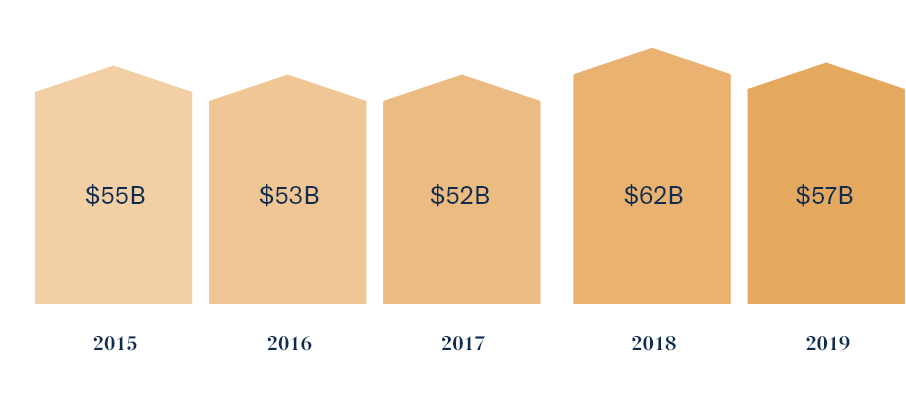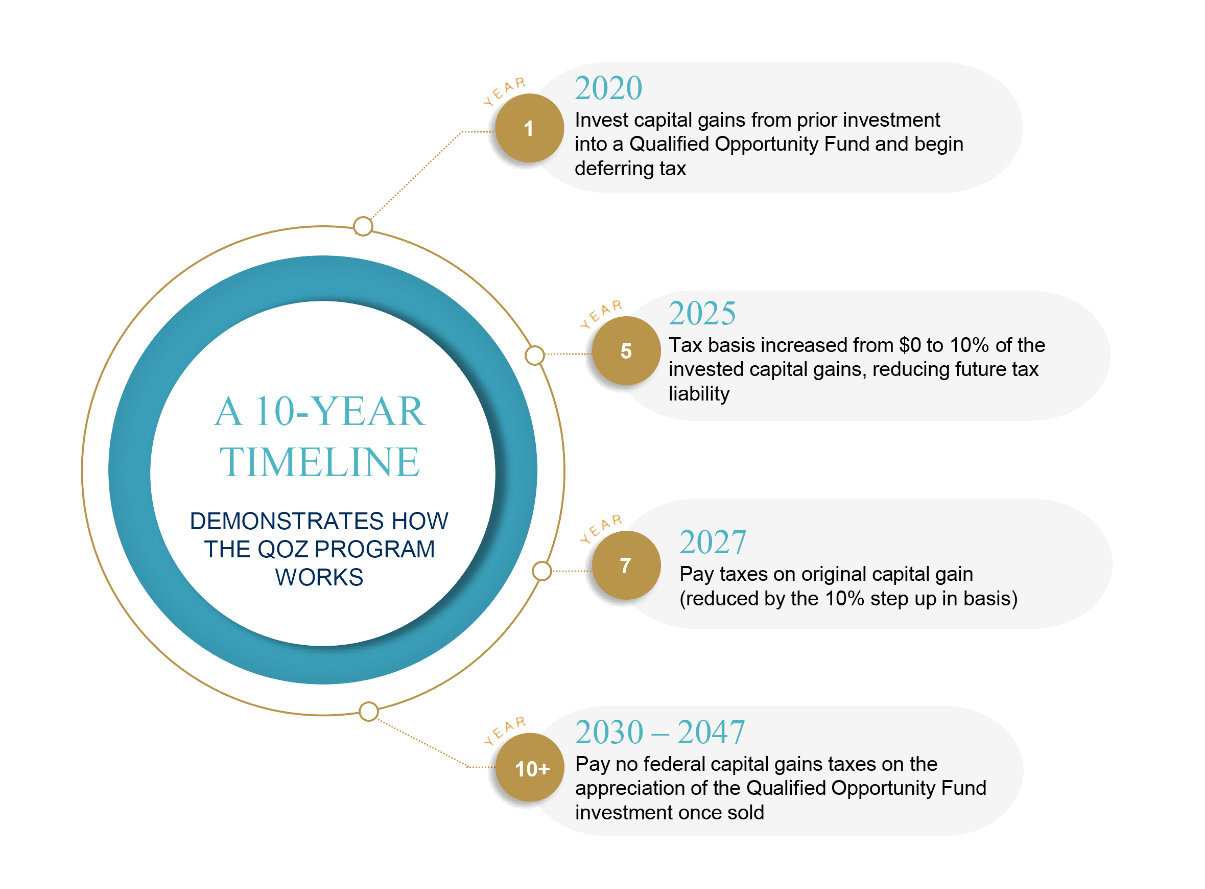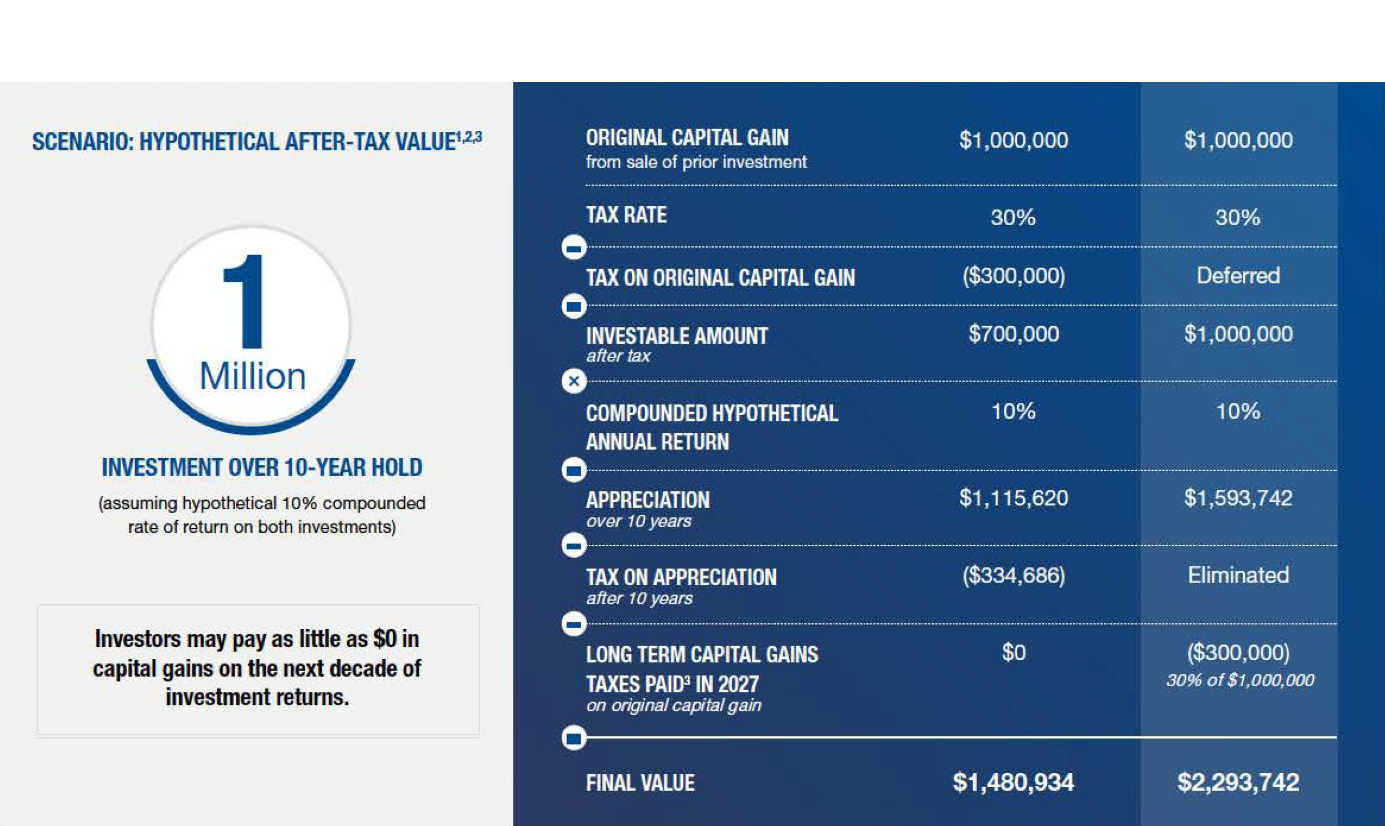The Qualified Opportunity Zone Program, created by the Tax Cuts and Jobs Act of 2017, is a tax incentive program designed to encourage long-term private sector investments in designated communities known as Qualified Opportunity Zones by delivering certain tax benefits to investors through investment vehicles called Qualified Opportunity Funds.
A designated census tract in the United States that has been selected by a state governor and certified by the U.S. Department of Treasury for inclusion in the QOZ Program. There are over 8,700 Qualified Opportunity Zones.
An investment vehicle organized as either a partnership or corporation that holds at least 90% of its assets in QOZ property. QOFs can make investments in a wide variety of real estate or new or existing businesses, including commercial real estate, housing, infrastructure and start-up businesses. QOFs can hold single or multiple assets.
Total investments in markets now deemed Qualified Opportunity Zones. Even before the current legislation was enacted, these areas attracted significant institutional capital.

Newmark Knight Frank Research, Real Capital Analytics (inclusive of activity in areas prior to designation).

the inclusion of capital gains invested in a QualifiedOpportunity Fund as taxable income until 2026

the taxable capital gain amount through step-up in basis by:
10% if held at least 5 years prior to Dec. 31, 2026. 15% if held at least 7 years prior to Dec. 31, 2026

on the appreciation of your investment in the Qualified Opportunity Fund if held at least 10 years

Created in 2017, as part of the Tax Cuts and Jobs Act, QOZs help stimulate economic growth in overlooked communities across the country. To achieve this, Congress passed special tax incentives to encourage investors to recognize a capital gain from the sale of an asset which they otherwise may not have sold due to the tax liability.
Under certain requirements, investors can roll over a portion, or all their capital gains into a Qualified Opportunity Zone Fund (QOF)—This gives them the potential ability to defer, or to avoid taxes entirely. This is a win-win program with benefits for multiple parties. Investors receive tax incentives to keep more of their capital gains, and afflicted communities in the U.S. receive the resources needed to turn their economy around. With 8700 QOZs located around the country, now is the time for investors to investigate these programs.
A unique initiative that preserves capital gains and delivers potential tax benefits to investors.
Created by the Tax Cuts and Jobs Act of 2017.
8762 Qualified Opportunity Zones located across the U.S.
Encourages long-term investments in designated communities known as Qualified Opportunity Zones.
Individuals or entities that invest their capital gains in these communities through investment vehicles called Qualified Opportunity Funds may receive multiple tax benefits.

Below is a chart that shows the difference in returns on two hypothetical investments with the same internal rate of return (IRR}:

1. ThIs illustration assumes the investor is subject to the top marginal u_s_ federal income tax rate of 20% on long-term capital gains for individuals, the net investment income tax of 3.8%
and a state tax of 6.2% for a total tax liability of 30%. No brokerage or investment advisory fees are accounted for with respect to the non-OOF example above.
2. This assumes that the OOF investor is a resident of a state that conforms with the OOZ Program.
3. Assumes that the investor has no capital losses to reduce such capital gain and refers to the inclusion of the original, invested capital gains in such investor’s taxable income on December 31, 2026.
QOFs and 1031 exchanges both offer the potential for significant tax incentives and can be used in conjunction with one another. However, the two investment vehicles have many differences, and therefore, may be appropriate for different investors. Under the 2017 Tax Cuts and Jobs Act, real estate is the only asset class that retained its 1031 exchange privilege. Capital gains from assets such as stocks, bonds, art, wine, livestock, classic automobiles, and other collectibles no longer receive the tax benefits of a 1031 exchange. Only real estate held for business or investment purposes can utilize the 1031 exchange while a capital gain from real estate or most other assets can be invested in a QOF.
Gains recognized from the disposition of the following assets are eligible to receive the respective tax benefits of the 1031 exchanges and investments in QOFs.
Our client’s had owned a successful small family business in construction and decided to sell after 20+ years in the industry. They received an offer in the mid-7 figures and looking at a capital gain of about $3M. They wanted to mitigate as much tax as possible, so we recommended a combination of strategies, of which were Opportunity Zones.
They clients chose to place $1M in 3 different Opportunity Zone funds and were able to defer the tax on that portion of their gain. After approx. 30 months the properties in the funds where constructed, leased and fully stabilized, and at that point paying a blended annual distribution of approx. 7% to the clients. We plan on holding these funds for over 10 years, when upon sale of the underlying properties, the capital gains from both he sale of the business and the sale of the Opportunity Zone funds will be eliminated.
* The scenarios provided herein are meant only to demonstrate principals. There can be no guarantee of performance or that any investment will achieve its stated objectives.
Start making more informed choices for your financial future with Breakwater Capital. Schedule a free in-person or virtual consultation so we can get to know each other. During our meeting we will discuss your finances at length to determine if Breakwater Capital is right for you.
Fill out a Contact Form to Request More Information or Schedule a Consultation

9940 Research Dr. Suite 200 Irvine, CA 92618
(310) 940-9430
Josh@Breakwater1031.com
Sign up to receive the latest1031 Exchange Deals and news from Breakwater Capital.
All investing involves risk of loss of some or all principal invested. Past performance is not indicative of future performance. There can be no guarantee that any investment or strategy will achieve its stated objectives. Speak to your tax and/or financial professional prior to investing. Securities and advisory services through Emerson Equity LLC, member FINRA and SIPC and a registered investment adviser. Emerson is not affiliated with any other entity identified herein.
There is no guarantee that any strategy will be successful or achieve investment objectives; Potential for property value loss – All real estate investments have the potential to lose value during the life of the investments; Change of tax status – The income stream and depreciation schedule for any investment property may affect the property owner’s income bracket and/or tax status. An unfavorable tax ruling may cancel deferral of capital gains and result in immediate tax liabilities; Potential for foreclosure – All fnanced real estate investments have potential for foreclosure; Illiquidity –These assets are commonly offered through private placement offerings and are illiquid securities. There is no secondary market for these investments;Reduction or Elimination of Monthly Cash Flow Distributions – Like any investment in real estate, if a property unexpectedly loses tenants or sustains substantial damage, there is potential for suspension of cash flow distributions; Impact of fees/expenses – Costs associated with the transaction may impact investors’ returns and may outweigh the tax benefts. Stated tax benefts – Any stated tax benefts are not guaranteed and are subject to changes in the tax code. Speak to your tax professional prior to investing.
Investing in opportunity zones is speculative. Opportunity zones are newly formed entities with no operating history. There is no assurance of investment return, property appreciation, or profits. The ability to resell the fund’s underlying investment properties or businesses is not guaranteed. Investing in opportunity zone funds may involve a higher level of risk than investing in other established real estate offerings. Long-term investment. Opportunity zone funds have illiquid underlying investments that may not be easy to sell and the return of capital and realization of gains, if any, from an investment will generally occur only upon the partial or complete disposition or refinancing of such investments. Limited secondary market for redemption. Although secondary markets may provide a liquidity option in limited circumstances, the amount you will receive typically is discounted to current valuations. Difficult valuation assessment. The portfolio holdings in opportunity zone funds may be difficult to value because financial markets or exchanges do not usually quote or trade the holdings. As such, market prices for most of a fund’s holdings will not be readily available. Capital call default consequences. Meeting capital calls to provide managers with the pledged capital is a contractual obligation of each investor. Failure to meet this requirement in a timely manner could elicit significant adverse consequences, including, without limitation, the forfeiture of your interest in the fund. Leverage. Opportunity zone funds may use leverage in connection with certain investments or participate in investments with highly leveraged capital structures. Leverage involves a high degree of financial risk and may increase the exposure of such investments to factors such as rising interest rates, downturns in the economy or deterioration in the condition of the assets underlying such investments. Unregistered investment. As with other unregistered investments, the regulatory protections of the Investment Company Act of 1940 are not available with unregistered securities. Regulation. It is possible, due to tax, regulatory, or investment decisions, that a fund, or its investors, are unable realize any tax benefits. You should evaluate the merits of the underlying investment and not solely invest in an opportunity zone fund for any potential tax advantage.